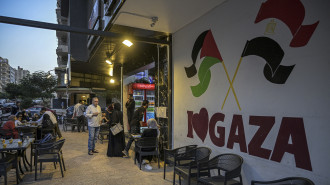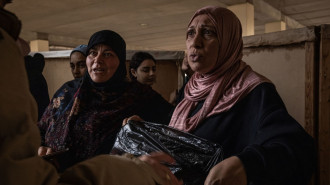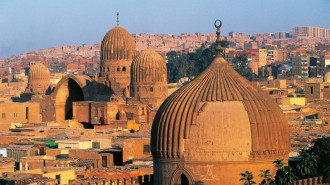
As Macron tightens grip on religious freedoms, French Islamophobia finds inspiration in UAE's repression

After having retraced the Paris Mosque's history, French President Emmanuel Macron demanded political obedience by delineating the overarching vision the Mosque embodied: an Islam in, with and of France that is both faithful and willing to promote the values of the Republic.
The “values of the Republic” have become boundaries delimiting the political space Islam and French Muslims operate within – a space which recognises submission.
According to Macron, Islam must be “compatible with the Republic”. Indeed, incompatibility indicates a clear form of “separatism”, a concept the President started to use two years ago when he introduced the anti-Separatism Bill.
This idea of separatism points to a forbidden territory for Muslims: political dissent and religious freedom. In other words, Islamic religiosity is contingent on the State's stamp of approval.
"[In his speech to the Paris Mosque] Macron disclosed his steps to establish a 'French Islam' that is theologically distinct from orthodox Islam and politically subservient to the Republic"
Promoting an Islamophobic system of governance
Using a patronising tone reminiscent of France’s colonial history, Macron then described his Islamophobic system of governance, including the anti-Separatism law adopted last year.
The law – with its aim to strengthen a four-year-long public policy entitled “systematic obstruction” – has produced dramatic effects and severe curtailments of Muslims’ fundamental rights and civil society as proven by a CAGE report authored and published last March.
Framed around the necessity to protect national security, the Republic and secularism, the state’s sponsored Islamophobia used this law – and any other relevant legal tool – to investigate 26,614 Muslim establishments (from businesses to schools and mosques) whereby 836 of them were closed down, while 55.9 million euros were seized.
In the last four years, numerous and well respected Muslim organisations – like human rights defenders CCIF, humanitarian NGO Barakacity or the Nawa publishing house – were shut down by the government.
As Macron’s Interior Minister Gérald Darmanin stated, “terror" is the obvious objective of this radical approach which – as the data clearly indicates – describes the reality of state-led anti-Muslim persecution.
The psychological consequences are slowly emerging. Disturbingly, fear and paralysis are slowly becoming widespread among a community of at least six million people – feelings that have led a growing number of Muslims to the path of emigration.
The future of 'French Islam'
In the speech, Macron disclosed his steps to establish a “French Islam” that is theologically distinct from orthodox Islam and politically subservient to the Republic.
The Grand Mosque will be incorporated into the newly created “French Islam Forum”, where Muslim organisations and institutions entirely loyal to the state will siege.
To be part of it, signing the controversial “Imam’s Charter” – which establishes a hierarchy between the state’s norms and Islam’s in favour of the former – will be a sine qua non-condition.
Moreover, politically driven research promoting unorthodox practices alien to traditional Islam is to be encouraged by the state – an idea suggested by the liberal think tank Montaigne in a 2016 report – to establish a new theology in accordance with French republican values.
The commemoration ended with Macron awarding the mosque’s rector Chems-Eddin Hafiz – an ex-lawyer with no religious training – with the Légion d’Honneur, the highest French medal of merit.
The French approach, here explicitly laid down by Macron, echoes the “Muslim policies” undertaken by authoritarian regimes. When analysing the French Islamophobic system, one can identify France’s inspirations.
The UAE for example – which was recently described by Macron as a “model and trustworthy partner” and whose deep and close political connections with France have been lately unveiled – has adopted a radical policy in the last decade to tackle what they label as “political Islam”.
The UAE used every means at their disposal to suffocate political dissent, including torture and established an institution called the Fatwa Council which is headed by submissive personalities.
Abu Dhabi Crown Prince Mohammed bin Zayed has reportedly championed the need to crack down on “political Islam” in discussions with the French Economy Minister, Bruno Le Maire.
France, like its ally, also uses any tool at its disposal and has designed a new institution composed of submissive elements whose task is to deliver religious cover to its injustices.
The similarities between the two states’ policies are alarming signs for human rights defenders.
Just like French Islamophobia and “French Islam” partially sprang from the UAE’s authoritarian vision, European Islamophobia could very well be reinvigorated and modelled by the French one.
French institutions in charge of Islamophobia – like the SG-CIPDR, the state’s official Islamophobic propaganda arm – have already engaged to promote these efforts, sharing the French model with almost 30 embassy representatives.
To prevent this anti-Muslim persecution from broadening its scope, it is our collective duty to support French Muslims in their difficult struggle and challenge France’s anti-Muslim politics.
Rayan Freschi is a French jurist and researcher at the London-based advocacy organisation CAGE
![Protesters hold a banner during a demonstration against the anti-Separatism bill and Islamophobia in Paris. The banner reads "Front against Islamophobia and for equal rights for all" [Getty Images]](/sites/default/files/styles/medium_16_9/public/2022-12/GettyImages-1231851371.jpg?h=199d8c1f&itok=uYsJKe_9)
![Palestinians mourned the victims of an Israeli strike on Deir al-Balah [Getty]](/sites/default/files/styles/image_684x385/public/2024-11/GettyImages-2182362043.jpg?h=199d8c1f&itok=xSHZFbmc)


![The law could be enforced against teachers without prior notice [Getty]](/sites/default/files/styles/image_684x385/public/2178740715.jpeg?h=a5f2f23a&itok=hnqrCS4x)
 Follow the Middle East's top stories in English at The New Arab on Google News
Follow the Middle East's top stories in English at The New Arab on Google News


